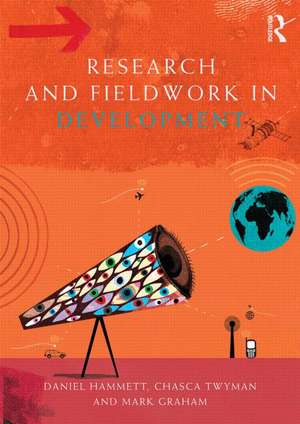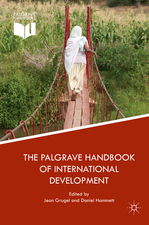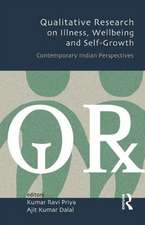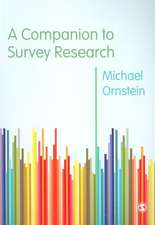Research and Fieldwork in Development
Autor Daniel Hammett, Chasca Twyman, Mark Grahamen Limba Engleză Paperback – 4 dec 2014
This book provides an invaluable overview to the practice of international development research and serves as an essential resource for undergraduate and postgraduate student embarking of development fieldwork. It is supported by online resources including extended bibliographies for each chapter, example risk and ethic forms, example policy briefing notes, research reports, links to websites and data sources.
| Toate formatele și edițiile | Preț | Express |
|---|---|---|
| Paperback (1) | 488.90 lei 3-5 săpt. | +25.66 lei 5-11 zile |
| Taylor & Francis – 4 dec 2014 | 488.90 lei 3-5 săpt. | +25.66 lei 5-11 zile |
| Hardback (1) | 880.46 lei 6-8 săpt. | |
| Taylor & Francis – 10 dec 2014 | 880.46 lei 6-8 săpt. |
Preț: 488.90 lei
Preț vechi: 531.42 lei
-8% Nou
Puncte Express: 733
Preț estimativ în valută:
93.56€ • 97.32$ • 77.24£
93.56€ • 97.32$ • 77.24£
Carte disponibilă
Livrare economică 24 martie-07 aprilie
Livrare express 08-14 martie pentru 35.65 lei
Preluare comenzi: 021 569.72.76
Specificații
ISBN-13: 9780415829571
ISBN-10: 0415829577
Pagini: 352
Ilustrații: 35 black & white illustrations, 6 black & white tables, 19 black & white halftones, 16 black & white line drawings
Dimensiuni: 174 x 246 x 23 mm
Greutate: 0.59 kg
Ediția:1
Editura: Taylor & Francis
Colecția Routledge
Locul publicării:Oxford, United Kingdom
ISBN-10: 0415829577
Pagini: 352
Ilustrații: 35 black & white illustrations, 6 black & white tables, 19 black & white halftones, 16 black & white line drawings
Dimensiuni: 174 x 246 x 23 mm
Greutate: 0.59 kg
Ediția:1
Editura: Taylor & Francis
Colecția Routledge
Locul publicării:Oxford, United Kingdom
Public țintă
Postgraduate and UndergraduateCuprins
Part One: Planning Research 1. Introduction 2. The Contested Terrain of Development Fieldwork 3. The Lone Wolf and the Pack: Entering the Field Alone and in Groups 4. Ethics in Development Fieldwork 5. Risk and Fieldwork 6. Integrating Methods Part Two: Collecting and Analysing Data 7. Interviews and Focus Groups 8. Ethnography and Participant Observation 9. Participatory Methods 10. Archives, Documentary and Visual Data 11. Quantitative Methods and Survey Data 12. Big Data and Social Media 13. Locational/Spatial Data Part Three: Presenting and Writing Up Research 14. Visualising Data 15. Writing for Different Audiences 16. Knowledge Exchange and Research Methods
Recenzii
"Students of international development will find this guide to research and fieldwork an invaluable and highly practical resource, from planning research and collecting and analysing data to presenting results, including how to target non-academic audiences." – Spore magazine
"As an instructional resource for undergraduate students new to development field research, the volume strikes a good balance between the breadth of information and minutiae of planning and execution. Readings suggested in each chapter are valuable for the interested reader. " -Smita Ramnarain, European Journal of Development Research
"As an instructional resource for undergraduate students new to development field research, the volume strikes a good balance between the breadth of information and minutiae of planning and execution. Readings suggested in each chapter are valuable for the interested reader. " -Smita Ramnarain, European Journal of Development Research
Descriere
Research and Fieldwork in Development explores both traditional and cutting edge research methods, from interviews and ethnography to spatial data and digital methods. Each chapter provides the reader with an understanding of the theoretical basis of research methods, reflects upon their practice and outlines appropriate analysis techniques. The text also provides a cutting edge focus on the role of new media and technologies in conducting research. The final chapters return to a set of broader concerns in development research, providing a new and dynamic set of engagements with ethics and risk in fieldwork, integrating methods and engaging development research methods with knowledge exchange practices. Each chapter is supported by several case studies written by global experts within the field, documenting encounters and experiences and linking theory to practice. Each chapter is also complimented by an end of chapter summary, suggestions for further reading and websites, and questions for further reflection and practice.

















